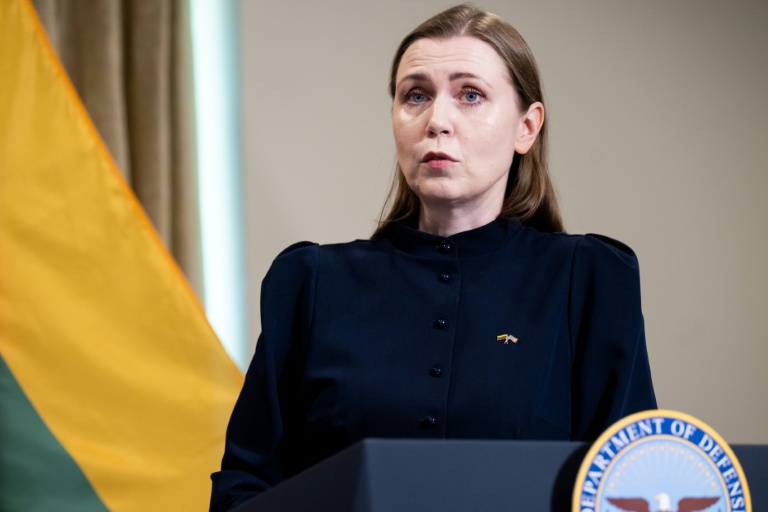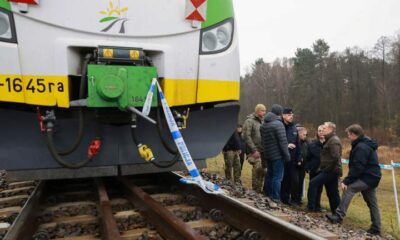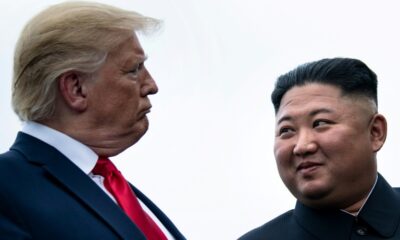World
Lithuanian Defence Minister Resigns Over Budget Dispute

Lithuania’s Defence Minister, Dovile Sakaliene, announced her resignation on Wednesday, following a significant disagreement with Prime Minister Inga Ruginiene regarding military spending priorities. This decision comes amid heightened concerns over national security, particularly given Lithuania’s proximity to Belarus and the Russian enclave of Kaliningrad.
In a post on Facebook, Sakaliene expressed that she and Ruginiene, both members of the Social Democratic Party (LSDP), hold “fundamentally different ideas on how to strengthen defence.” Ruginiene characterized the resignation as “inevitable,” pointing out that she could not accept the emergence of “misunderstandings and problems” in such a critical area as national defence.
The disagreement escalated after both leaders attended a meeting with defence analysts last week. Participants of the meeting indicated they were skeptical that the government would maintain its commitment to allocate five percent of the country’s GDP to military expenditures. This commitment was initially set in response to increasing regional security threats following Russia’s invasion of Ukraine in 2022.
On October 15, Ruginiene revealed that the draft state budget for 2026 includes 4.8 billion euros (approximately $5.6 billion) for defence, translating to about 5.4 percent of GDP. This positions Lithuania among the top spenders in NATO, reflecting the nation’s ongoing efforts to bolster its military capabilities.
Ruginiene reiterated her commitment to ensuring that defence spending continues to rise, stating her determination to uphold this critical aspect of governance. Furthermore, she alleged that Sakaliene exhibited a “total lack of will” to collaborate on defence matters effectively, underscoring the rift between the two leaders.
The government in Lithuania operates as a coalition, primarily involving the LSDP and the populist Dawn of Nemunas party. This coalition’s dynamics may further complicate the future of defence policy, especially as NATO has set a new target for its 32 member countries to allocate five percent of GDP to defence by 2035. Presently, over a quarter of NATO nations are still below the previous target of two percent, as highlighted by the alliance’s most recent assessments.
As the situation unfolds, the implications of this leadership change could influence Lithuania’s military strategy and its role within NATO. The resignation of Sakaliene not only reflects internal governmental challenges but also raises pertinent questions about the country’s preparedness in a volatile geopolitical landscape.
-

 Politics1 month ago
Politics1 month agoSecwepemc First Nation Seeks Aboriginal Title Over Kamloops Area
-

 World5 months ago
World5 months agoScientists Unearth Ancient Antarctic Ice to Unlock Climate Secrets
-

 Entertainment5 months ago
Entertainment5 months agoTrump and McCormick to Announce $70 Billion Energy Investments
-

 Science5 months ago
Science5 months agoFour Astronauts Return to Earth After International Space Station Mission
-

 Lifestyle5 months ago
Lifestyle5 months agoTransLink Launches Food Truck Program to Boost Revenue in Vancouver
-

 Technology3 months ago
Technology3 months agoApple Notes Enhances Functionality with Markdown Support in macOS 26
-

 Lifestyle3 months ago
Lifestyle3 months agoManitoba’s Burger Champion Shines Again Amid Dining Innovations
-

 Top Stories2 months ago
Top Stories2 months agoUrgent Update: Fatal Crash on Highway 99 Claims Life of Pitt Meadows Man
-

 Top Stories2 weeks ago
Top Stories2 weeks agoHomemade Houseboat ‘Neverlanding’ Captivates Lake Huron Voyagers
-

 Politics4 months ago
Politics4 months agoUkrainian Tennis Star Elina Svitolina Faces Death Threats Online
-

 Sports5 months ago
Sports5 months agoSearch Underway for Missing Hunter Amid Hokkaido Bear Emergency
-

 Politics5 months ago
Politics5 months agoCarney Engages First Nations Leaders at Development Law Summit



















